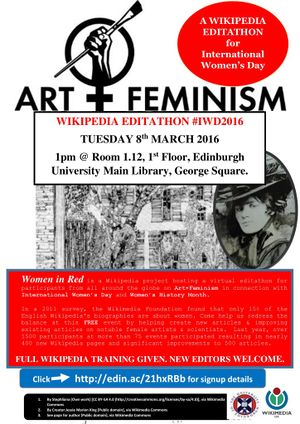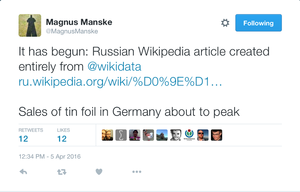Friends' Newsletter/2016/Issue 01: Difference between revisions
No edit summary |
No edit summary |
||
| Line 108: | Line 108: | ||
Wikimedia's projects all link up. They're like a giant brain where connections are made between different parts of the whole. Wikidata now links Wikipedia articles together so we can [http://www.theregister.co.uk/2016/02/25/wikidata_turns_the_world_into_a_database/ answer questions] like 'What are the 10 largest cities with female mayors?' | Wikimedia's projects all link up. They're like a giant brain where connections are made between different parts of the whole. Wikidata now links Wikipedia articles together so we can [http://www.theregister.co.uk/2016/02/25/wikidata_turns_the_world_into_a_database/ answer questions] like 'What are the 10 largest cities with female mayors?' | ||
[[File:WikidataTweet.png|300px|left]] | |||
It is now possible to create Wikipedia articles generated automatically from Wikidata content. | |||
==Dates for the diary== | ==Dates for the diary== | ||
Revision as of 15:31, 14 April 2016
Open Sesame!
Welcome back from John, our new Communications Coordintor
Hello friends. We're sorry it's been a while but as you can appreciate, our communications have been on the back burner as we've not had a comms person in post for the last six months. Now I've taken over from Stevie Denton, I'll be concentrating on helping to promote WMUK's work, communicating our goals, supporting our amazing volunteers and showcasing the valuable work of our Wikimedians in Residence.
Our social media channels will be refreshed and you'll see us communicating much more on Facebook and Twitter, and I hope to be producing a lot more content and materials for people who want to engage with our projects, whether as editors, trainers, teachers or institutions.
Wikimedia UK wants be a central pillar of the Open Knowledge movement around the world. One of the UK's greatest resources is its educational sector, and by helping to make it more open and accessible to everyone no matter their social or financial situation, we can add value to the UK economy and make sure the world benefits at the same time.
It's a really exciting journey to be starting with WMUK and I hope you will join us and get involved.
John Lubbock, Communications Coordinator
The Radically Open Society
As society and culture become increasingly complex, openness is becoming the new norm.
One of the best things about open source software is that you know it has been peer-reviewed. Anyone can look at its code, ensure that it works and that there are no vulnerabilities or backdoors inserted by a devious company or government. The UK government’s current Investigatory Powers Bill envisages the power to serve orders on Communications Service Providers like BT and Whatsapp to provide access to their users information. If you use open source software, however, there is no company which a government can compel to modify their code.
As we create bigger and bigger stores of data, that data becomes more and more vulnerable to attack. Governments themselves need strong encryption and software which ensures the highest standards of data protection for the records they hold. It is a fundamental mistake for security services to believe that they can create vulnerabilities in software which only they can exploit.
Slowly the value of government openness is becoming clearer. A lack of openness creates a lack of public trust. Last week David Cameron moved from saying his tax affairs were a private matter to publishing his tax return within 5 days. This insistence on more government openness can only be a good thing. Just because we pride ourselves on having greater government transparency than North Korea, it doesn’t mean we couldn’t improve.
One thing I learned studying international politics and human rights is that all rights are interdependent. It is not enough to just have freedom of speech if access to that speech is unequal. To make freedom of speech work well, we need freedom of information. That’s why I’m proud to have joined Wikimedia UK, because the drive for open knowledge is an important part of making society more equal, reducing barriers to accessing services, information, software and other educational tools.
We are still at the dawn of a truly Open Society and we have a long way to go. Writing The Open Society and its Enemies in 1945, Karl Popper was mainly concerned to support the idea of Liberal Democracy against the authoritarianism of fascism and communism.
“this civilization has not yet fully recovered from the shock of its birth — the transition from the tribal or "enclosed society," with its submission to magical forces, to the 'open society' which sets free the critical powers of man.” - Karl Popper
Now that Liberal Democracy has become the dominant sociopolitical system in the world, it is not time for us to rest on our laurels. This kind of system can still produce authoritarianism and corruption, and that is why we must entrench the ideal of openness in the DNA of our public and private institutions, and show them that far from being a threat, open knowledge is a positive-sum good which can benefit everyone.
John Lubbock, Communications Coordinator
Teaching with Wikipedia
A recent survey by Yougov found that around two thirds of the British public trust Wikipedia more than traditional news outlets including the BBC, ITV, the Guardian and the Times.
One of the most visited websites worldwide, and now one of the most trusted, Wikipedia is a resource used by most university students. Increasingly, many instructors around the world have used Wikipedia as a teaching tool in their university classrooms as well.
As the drive for scholarly research to become ever more Open Access gathers pace, Wikipedia will increasingly become the digital gateway to this research.
- Brits trust Wikipedia more than the news – survey
- Reasons to use Wikipedia – Wikimedia Education
- Wikipedia amplifying impact of open access – LSE blogs
- Writing for Wikipedia has forced me into good scholarly habits and accessible writing – LSE Blogs
Some years ago, I read the University of Huddersfield’s Engaging the ‘Xbox Generation of Learners’ in Higher Education where they describe the concept of students ‘powering down’ or disengaging from learning because “their preferred technologies and the technological skills they have acquired are not provided for…”
Empowering learning is therefore the opposite scenario where the technologies students “use effectively outside the classroom in their personal learning and leisure are used to enhance learning in the curriculum.”
As the Wikimedian at the University of Edinburgh, my year-long residency is to further both the university’s commitment to digital literacy as well as the quantity & quality of open knowledge. More practically, this will involve delivering skills-training sessions which will fit in with and enhance, the learning & teaching within the curriculum.

Wikipedia editing sessions will be a large part of this, and we’ve just had a terrifically successful History of Medicine editathon for Innovative Learning Week which you can learn more about here: Storify - story of History of Medicine Wikipedia editathon as well as more recent editathons for Art+Feminism as part of Women’s History Month 2016.
However, the residency isn’t just about Wikipedia and there are numerous ways where staff & students can get involved & directly contribute their knowledge & expertise to develop Wikimedia UK’s diverse range of projects. More details of these projects can be found on my blog here: A smorgasbord of Wikimedia projects to choose from
Wikipedia is much more straightforward using the new Visual Editor interface which makes editing Wikipedia now as easy as using Microsoft Word. Students can be taught how to edit in up to 60mins and thereafter can research & write, with academic rigour, brand new Wikipedia articles.
Some recent examples of approaches to teaching with Wikipedia are detailed here:
- Teaching with Wikipedia (University of Edinburgh examples)
- How to use Wikipedia as a teaching tool
- Wikipedia Education Program - Case Studies
If you would like to know more about how Wikipedia fits in with academia then these recent articles make very compelling reading:
The project page for the residency with details on upcoming events is located here.
Ewan McAndrew - Wikipedian in Residence
#OER16
Wikimedia UK is hosting talks and workshops on Open Educational Resources in Leicester on May 21st.
‘Open education is a collective term to describe institutional practices and programmatic initiatives that broaden access to the learning and training traditionally offered through formal education systems.’ - Wikipedia
‘the future of learning is free and open.’ - New York Times
Wikimedia UK in partnership with the Learning and Work Institute is hosting a half-day event designed to take open education forward across the schools, further education, higher education and adult education sectors.
This free event is for existing Wikimedia volunteers, as well as educators and people supporting education who are interested in finding out how Wikimedia projects can support learning and learners in schools, FE, HE or Adult education.
This free day will be an opportunity to help shape Wikimedia UK’s future direction in relation to education. In particular, we are interested in expanding our work with higher education partners, and exploring the potential for pilot activities within formal education.
There will be presentations by Wikimedia UK CEO Lucy Crompton-Reid and educators who have led Wikimedia’s open education projects. There will then be workshops to allow attendees to explore open education based around different project ideas and education sectors.
For anyone in the education sector who is interested in open education and explore the possibility of developing pilot projects with WMUK.
Awaken the Dragon!
We are running contests to add articles about Wales to Wikipedia throughout April. There are weekly and overall prizes for the most number of core articles expanded and stubs filled out.
Please have a look at the project page for Awaken the Dragon to see an overview of the project.
You can find stub articles to edit here, core articles here, and more information about our Welsh projects on the blog.
There will be an editathon at the National Library of Wales on April 22nd run by our Wikimedian in Residence, Jason Evans who is based at the Library.
New Wikimedian in Residence at the Wellcome Library
A new Wikimedian in Residence will be starting work at the Wellcome Library in May. The Wellcome Library is one of the world’s major sources for the study of medical history. According to the Wellcome Library,
“Our collections cover so much more than the history of medicine – essentially life, death and everything in between, so there’s huge potential for improving the content on Wikipedia. We’ll also be looking at enriching other Wikimedia projects.”
24,000 images uploaded to Commons
User:Nilfanion has uploaded a massive cache of 24,000 images of various UK sites across 35 counties. Please get involved and help us add them to articles on Wikipedia.
Wikimedia's projects all link up. They're like a giant brain where connections are made between different parts of the whole. Wikidata now links Wikipedia articles together so we can answer questions like 'What are the 10 largest cities with female mayors?'
It is now possible to create Wikipedia articles generated automatically from Wikidata content.
Dates for the diary
You can see our full events list here.
_____________________________________
Wikimedia Conference 2016 Berlin
22-24th April
30th April
5th May
Shakespeare in London: A Wikipedia Workshop
7th May
8th May
Edinburgh Regenerative Medicine editathon
11th May
15th May
Wikimedia UK Education, Leicester
21 May
Glasgow Art + Feminism editathon
25th May







